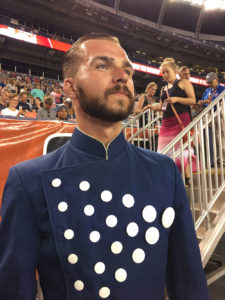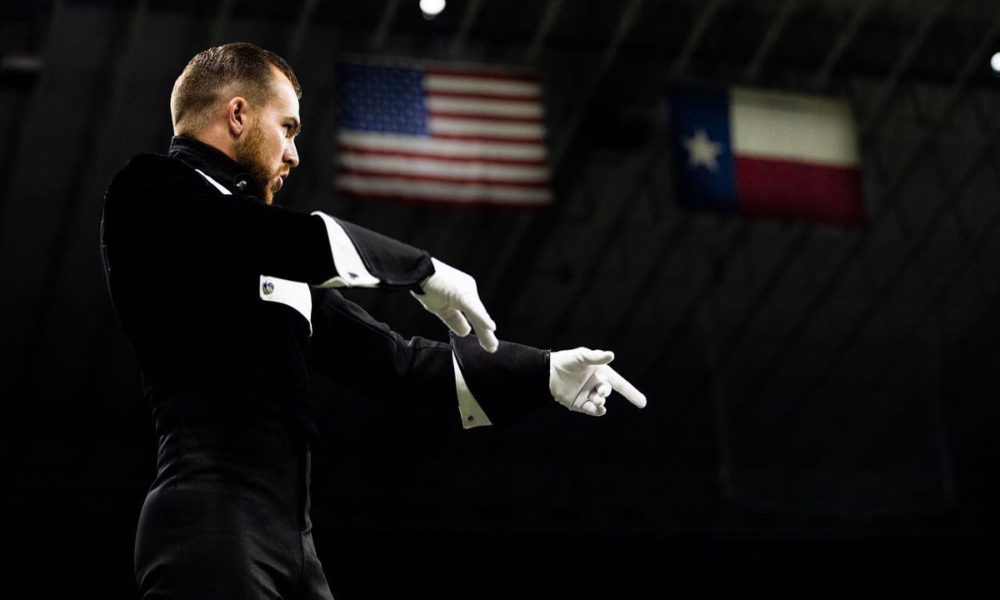 As the drum corps activity progressed through the end of the last decade, so did the concept of student leadership.
As the drum corps activity progressed through the end of the last decade, so did the concept of student leadership.
A little more than four years ago, I sat in my interview to be a drum major for the Blue Knights Drum and Bugle Corps. The very first question was simple but profound enough that I remember the moment: “Why do you want to be a drum major?”
“Because I want to make a difference,” I stated confidently.
My answer was truthful then and truthful every moment of my six years as drum major for two different organizations, but only in my very last year did I find out how to truly make that difference.
Serving the System?
During my two years as a high school drum major at Milford (Ohio) High School and first three as a drum major with the Blue Knights, I honed my capabilities as a conductor, rehearsal facilitator, logistics extraordinaire, and positive social influencer, among the many other roles I played. I constantly worked to build myself up and better serve the system around me.
Despite my efforts, I finished each season feeling somewhat unsatisfied with what I did, unhappy with how much of a difference I made. The issue wasn’t my ability; it was a problem regarding my areas of focus.
Before I explain further, let’s take a look at the specific years I spent in drum corps. I participated from 2016 through 2019. In my first year, nearly all corps wore headgear, and some still exited the field with a tap-off. A lot changed in my four years, but truly the greatest changes happened outside of performance. I witnessed nutritional program reform and a recommitment to physical safety. I witnessed the #MeToo movement bring the activity’s sexual misconduct issues to the foreground and with it the advent of whistleblower infrastructure and explicit policy changes. I witnessed a newfound, heightened concern for the overall well-being of performers.
Going into my age-out summer, I realized that change was possible and also that much more work needed to be done. Though I had grown myself as a leader through several years, I took a hard look at what that meant. I had dedicated myself to ensuring that things ran smoothly, that everything was constantly in the right place, and that the corps made it to Indianapolis for championships in one piece. I existed as a leader to maintain the system around me; that is how the drum major role has existed for ages. I realized that the traditional drum major position is not truly one of a leader but one of a manager. A manager is tasked with upholding the status quo whereas a leader evaluates and improves upon the status quo.
Crafting Change
In my final year behind the baton, I wanted to be a leader. I analyzed aspects of the program that had previously left me feeling dissatisfied: an improper work-rest balance, the fragmentation of the group into autonomous sections, a pervasive culture of hypermasculinity, and a lack of emphasis on experiences outside of performance. I knew that I had finally found my chance to make a true difference.
I started before the first camp by creating a meticulous, thorough document detailing the challenges and potential solutions for my organization. I made refinements with one of my co-drum majors, and we emailed the document out in the early morning of our first camp. Because the Blue Knights staff members trust their student leaders, the document was met with enthusiasm instead of defensiveness. I’m incredibly thankful for that environment.
With the green light, we got to work, crafting new structures and implementing changes. We secured an extra half hour for dinner and an extra hour of free time at the end of the day, each day. We secured more free days. We received time every day in the first week for cultural development. We completely revamped our tour job system by mixing the composition of teams. We made a website of every member’s picture and information and gave everyone access to learn about each other. We built a culture of inclusivity, wholesomeness, and care for each other.
Being a Force for the Future
The results were incredible. We created immense change in one year, and everyone benefited. That summer turned into the most fulfilling experience I ever had in the marching activity, and that sentiment was widely and enthusiastically shared.
But the moral here isn’t the specifics of what I did or what my corps did. Rather, it’s the sentiment that this activity is constantly progressing and is ripe with opportunities for young leaders. You are never merely a spectator of your own experience. People’s lives are changed in this activity. You absolutely can be a force for positive change in your corner of this world. You can make the experience as positively life-changing as possible for yourself and others.
I’m honored to have been hired as the director of membership experience for the Blue Knights. It is a new position in the activity but one that I hope catches on. I’m incredibly excited to continue building on the marching arts experience, but I’m even more excited to watch new, young leaders take even greater strides and make their own differences.


